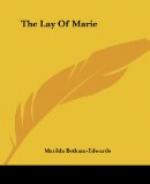In examining the manner in which she speaks of herself, we shall perceive she does not call herself Marie de France, as he has stated, but says she is from France.
Al finement de cest escrit,
Me nomerei par remembrance,
Marie ai non si suis de France,
&c.[20]
If we consider well the latter verse, there will be no difficulty in perceiving that Mary wrote in England. Indeed, it was formerly a very common thing for authors to say that they were of such a city, and even to assume the name of it. Or even, when writing in Latin, state themselves either natives of England, or of France. But when an author writes in France, and in the language of the country, he does not say that he is of France. Now this precaution, on the part of Mary, implies that she wrote in a foreign country, the greater part of whose inhabitants spoke her native language; which was the case in England. She stated herself to be a native of France, that her works might be regarded as written in a purer and correcter style.
Monsieur le Grand does not believe that Mary really translated from a collection that existed in her time in the English language, under the title of the Fables of Aesop; but, if we examine the fables themselves, we shall discover in them internal evidence of their being translated from the English.
Mention is made of counties and their judges, of the great assemblies held there for the administration of justice, the king’s writs, &c. &c. Now what other kingdom, besides England, was at that time divided into counties? What other country possessed similar establishments? But Mary has done more; in her French translation she has preserved many expressions in the English original; such as welke, in the fable of the Eagle, the Crow, and the Tortoise; witecocs, in that of the Three Wishes; grave, in that of the Sick Lion; werbes and wibets, in that of the Battle of the Flies with other Animals; worsel, in that of the Mouse and the Frog, &c.
The completest MS. of Mary’s translation, has but 104 fables; out of which, 31 only are Aesop’s. So the English version that she had before her, was not a true and complete translation of that fabulist, but a compilation from different authors, in which some of his fables had been inserted. Nevertheless, Mary has intitled her work, “Cy Commence li Aesope;” she repeats, also, that she had




